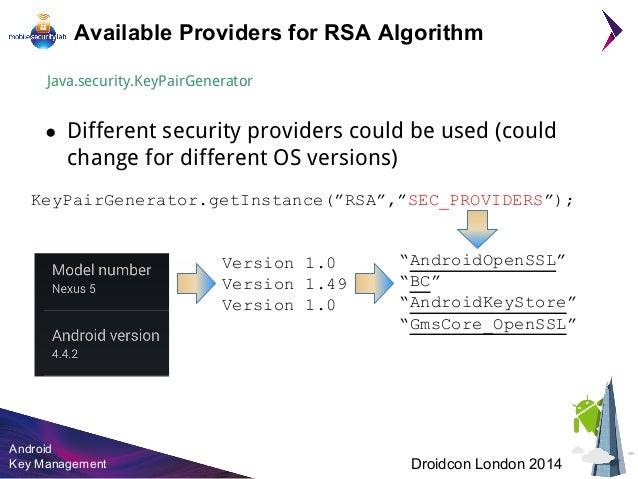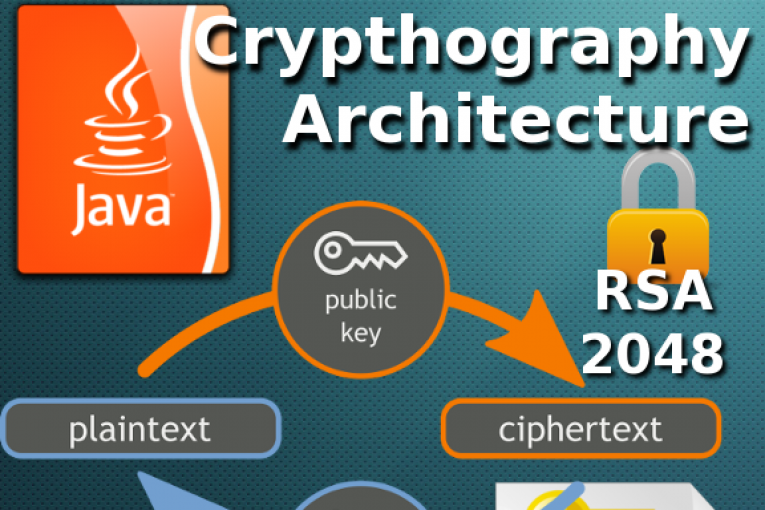Java Generate Rsa 2048 Key
- Rsa-2048 Using Cryptowall
- Java Generate Rsa 2048 Key Code
- Java Generate Rsa Key Pair
- Java Generate Rsa 2048 Keys

Programming forums Java Mobile Certification Databases Caching Books Engineering Micro Controllers OS Languages Paradigms IDEs Build Tools Frameworks Application Servers Open. Generate 2048 bit Sun RSAPrivateKey from a.pem file private key format. I have to create a RSA private key using RSA algorithm and 2048 bit. 2012-1-5 今天调查了C# RSA和Java RSA,网上很多人说,C#加密或者java加密 ,Java不能解密或者C#不能解密但是我尝试了一下,发现是可以的,下面就是我尝试的代码,如果您有什么问题,我想看看,他. 博文 来自: weixin33920401的博客. Sep 30, 2013 Hi guys!!! I'm learning RSA Encryption now and for this reason I'm programming a little sample in java in order to know how RSA works. But the problem here is that I can't know how programmers generate a Private Key or a Public Key(2048 bit Key) for making Encryption more secure.
getInstanceRsa-2048 Using Cryptowall
factory methods (static methods that return instances of a given class).- 2020-2-5 Using OpenSSL on a reasonably modern PC I can generate a 2048 bit key in 1 second and a 4096 bit key in generate big keys than smaller ones!
- Jan 24, 2017 Let us learn the basics of generating and using RSA keys in Java. Java provides classes for the generation of RSA public and private key pairs with the package java.security. You can use RSA keys pairs in public key cryptography. Public key cryptography uses a pair of keys for encryption.
- Dummy tools to generate RSA 2048 key pair, to encrypt strings with pub key and also decrypt string with private keys - RSAKeyGenMain.java.
A Key pair generator for a particular algorithm creates a public/private key pair that can be used with this algorithm. It also associates algorithm-specific parameters with each of the generated keys.
There are two ways to generate a key pair: in an algorithm-independent manner, and in an algorithm-specific manner. The only difference between the two is the initialization of the object:
- Algorithm-Independent Initialization
All key pair generators share the concepts of a keysize and a source of randomness. The keysize is interpreted differently for different algorithms (e.g., in the case of the DSA algorithm, the keysize corresponds to the length of the modulus). There is an
initializemethod in this KeyPairGenerator class that takes these two universally shared types of arguments. There is also one that takes just akeysizeargument, and uses theSecureRandomimplementation of the highest-priority installed provider as the source of randomness. (If none of the installed providers supply an implementation ofSecureRandom, a system-provided source of randomness is used.)Since no other parameters are specified when you call the above algorithm-independent
initializemethods, it is up to the provider what to do about the algorithm-specific parameters (if any) to be associated with each of the keys.If the algorithm is the DSA algorithm, and the keysize (modulus size) is 512, 768, or 1024, then the Sun provider uses a set of precomputed values for the
p,q, andgparameters. If the modulus size is not one of the above values, the Sun provider creates a new set of parameters. Other providers might have precomputed parameter sets for more than just the three modulus sizes mentioned above. Still others might not have a list of precomputed parameters at all and instead always create new parameter sets. - Algorithm-Specific Initialization
For situations where a set of algorithm-specific parameters already exists (e.g., so-called community parameters in DSA), there are two
initializemethods that have anAlgorithmParameterSpecargument. One also has aSecureRandomargument, while the the other uses theSecureRandomimplementation of the highest-priority installed provider as the source of randomness. (If none of the installed providers supply an implementation ofSecureRandom, a system-provided source of randomness is used.)

Java Generate Rsa 2048 Key Code
In case the client does not explicitly initialize the KeyPairGenerator (via a call to an initialize method), each provider must supply (and document) a default initialization. For example, the Sun provider uses a default modulus size (keysize) of 1024 bits.
Note that this class is abstract and extends from KeyPairGeneratorSpi for historical reasons. Application developers should only take notice of the methods defined in this KeyPairGenerator class; all the methods in the superclass are intended for cryptographic service providers who wish to supply their own implementations of key pair generators.
Java Generate Rsa Key Pair
Every implementation of the Java platform is required to support the following standard KeyPairGenerator algorithms and keysizes in parentheses:
Java Generate Rsa 2048 Keys
DiffieHellman(1024)DSA(1024)RSA(1024, 2048)